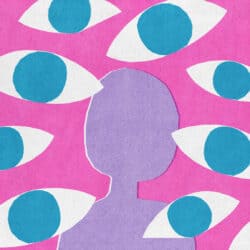Work is hard when meds and menstruation don’t get along. Philanthropist Journal writing fellow Lydia Phillip speaks to neurodivergent menstruators to better understand inherent challenges and build collective empathy toward more inclusive, accessible workplaces.
“I felt like I was crazy.”
“Everything felt like chaos.”
“The week before my period I don’t drive because my brain is so foggy.”
“I am inconsolably miserable.”
“I would try to quit my job, but then after my period I was fine.”
“My meds don’t work when I’m bleeding – am I nuts?”
“My IUD was removed and my medication stopped working.”
“I started looking online because I had no idea what was happening to me.”
***
The experience of neurodivergence and menstruation can be incredibly isolating and lonely for racialized women and gender-nonconforming people in the workforce. “I’m miserable during my period. It’s really sad but not something you can talk about,” says Olga, who uses she/her pronouns and identifies as a queer Latinx. Olga was diagnosed with attention-deficit hyperactivity disorder (ADHD) in her mid-30s (interviewees’ last names are not shared because of the sensitive nature of the conversation). “You deal with it in silence,” she says. “It can cause self-loathing and make you hate yourself if you’re not aware of what’s happening in your body.”
There’s little research and there are few global health initiatives dedicated to the intersection of menstruation and neurodiversity. It’s not well known that menstruation, premenstrual syndrome (PMS), premenstrual dysphoric disorder (PMDD), and other hormonal health conditions disproportionately affect autistic people and those with ADHD. “ADHD and PMDD are underdiagnosed,” says applied neuroscientist Naomi Glover, “which means neurodivergent people may be experiencing more extreme symptoms in the workplace, while not being treated.”
Not only can menstruation increase anxiety, depression, physical pain, cognitive impairment, and sleep loss; it also affects medication, which significantly disrupts work and life for neurodivergent people. This connection is particularly relevant to the non-profit sector, which is staffed largely by women in roles that typically offer less pay and fewer benefits than jobs in the overall economy, despite its necessary focus on equitable employment opportunities, community health initiatives, and gender and disability justice. This has implications for non-profit leaders whose staff may be navigating the often-invisible physical, psychological, and financial burdens in a sector that is notorious for burnout – which particularly affects retention and job satisfaction for disabled workers.
Work and neurodivergent burnout
ADHD is a neurodevelopmental disorder that affects executive and cognitive functioning, motivational systems, emotional regulation, and sensory processing. It also happens to be highly interactive with menstruation. “The hardest part is that people don’t believe how debilitating menstruation and ADHD can be,” Olga says. “There’s a stigma around periods, and when you add someone who is neurodivergent or taking medication, it’s even worse.”
Approximately 4% to 6% of adults in Canada have ADHD. Because of gender expectations, socialization, and systemic racial disparities, ADHD is under-recognized and underdiagnosed in women, Black and racialized people, and gender-diverse individuals, which often results in late diagnoses. While a diagnosis in adulthood is validating, earlier detection of ADHD can lead to greater supports, accommodations, and a healthier self-image. “I probably had a similar experience to a lot of people who aren’t cisgender men,” says Syd (they/them), a queer, non-binary creative who works in the video-gaming industry. “I just thought I was stupid and bad at things.”
ADHD brains are different neurologically and chemically, and though they often house brilliance, creativity, and unique ways to problem-solve and make sense of the world, the confines of capitalism, which enforces narrow definitions of “productivity” and “success,” can be disabling. For neurodivergent people who struggle to meet ableist expectations, this can mean underemployment, precarious work, chronic burnout, and comorbid health conditions.
After a career navigating neurotypical norms around communicating, processing, learning, socializing, and working, Olga recently transitioned to self-employment in a counselling and coaching capacity. “ADHD meant I was constantly masking at work,” she says, referring to the conscious act of suppressing neurodivergent behaviours and traits to be more palatable in work and social settings. Masking often requires an immense amount of emotional and physical energy. “I felt like I had to take on more and do it all. People would say, ‘You’re an overachiever! You’re so outgoing!’ But internally, I was suffering. I was working really, really hard and exhausted by the time I got home. I was chronically overwhelmed and burnt out.”
Simon says ‘fix’ your brain
Like all workers, neurodivergent people are subjected to a capitalist, ableist valuation of labour and ways of working. Survival is dictated by traits, roles, abilities, and social characteristics deemed “normal” to a profit-driven society. The pressures to conform often lead to pharmaceutical intervention – attempts to assimilate by quite literally adjusting and provoking the neurons in the brain.
Finding the right type and dosage of medication can be an expensive, exhausting process of experimentation and coping with adverse side effects. Insomnia, nausea, anxiety, depression, heart palpitations, panic attacks, migraines, and disordered eating can all accompany the journey of finding the right one. And when the doctor scribbles a prescription and the pharmacist hands over the white paper bag – leaning over the counter to discuss possible side effects, how and when to take your dose – it’s rare to learn about the effect menstruation may have on the medication. “Because no doctor is going to tell you ‘FYI, your period may mess up your medication,’” says Olga of the public-health knowledge gap. “It can lead you to chase other reasons why you feel so bad. Maybe I need anti-depressants or something else?”
The quest for medication can be a confusing and time-consuming activity that requires buy-in from a medical professional, flexibility to schedule appointments, financial means or a comprehensive drug plan (which is less accessible in non-profits), and the mental stamina to keep trying. It’s a daunting task to sustain the search while also trying to maintain work performance and productivity within a patriarchal system that doesn’t accommodate menstruating bodies.
Medication: A last resort or a lifesaver
It’s common for those with ADHD to have a complex relationship with medication. On one hand, taking medication represents the disheartening reality of a society that wasn’t designed for neurodivergent brains. It can feel like a last resort borne of desperation or despair. “It’s sad, but I don’t know what else to do to make myself the more normal, productive worker,” Syd says of taking medication. “It’s an otherness that doesn’t feel like me. I prefer who I am without meds.”
On the other hand, medication can be a lifesaver for those who have felt shame and guilt their entire lives, inventing a plethora of coping mechanisms to exist in an ableist, hyper-productive society. Medication can offer a chance for “normalcy,” to provide rhythm and flow, to alleviate the amount of energy it takes to make everyday tasks appear effortless. “Until medication, I never realized I lived in constant fear,” says Komal (she/they), a queer South Asian diagnosed with ADHD and autism. “I was overcompensating, implementing fail-safes, always waiting for the ball to drop.”
For Olga, ADHD medication was a remedy to chronic “overwhelm” and depression. She describes the ability to focus and an inner calm without the spiralling thoughts, agonizing over social interactions, and sleepless nights ruminating on work. She remembers one moment in particular: “I cried in the car listening to the radio because that’s when I realized that I was just listening to music. I could sing along to a song without a thousand things running through my head. It was just music.” Several interviewees expressed awe at discovering a different way of existing: “Is this how neurotypical people feel all the time?!”
Medication helped Olga find balance between her full-time job, community work, non-profit board service, and home life. She was able to be more present with her family, prioritize projects, and set healthy boundaries instead of spending hours, unpaid, outside of work to manage her overcommitments. “Medication changed my life for the better. Especially as a parent.”
Finally, the search leads to a medication with tolerable side effects; the benefits to work and home life outweigh the negatives. There’s a sense of feeling in control, collected, attentive, articulate – which can then all come crashing down.
Work is hard when meds and menstruation don’t get along
Lower estrogen levels during the menstrual phase affect neurotransmitters that influence executive functioning, emotional regulation, attention, and motivation. A recent study found that menstrual hormonal fluctuations can exacerbate ADHD symptoms and depression and decrease the effectiveness of ADHD medication. “We now realize that menstruation doesn’t just impact reproductive organs,” says Glover, who specializes in improving brain health and cognition. “The brain actually changes during the menstrual cycle.” She notes that “the research is really early, but there’s increasing suggestion that ADHD medication should be adjusted at different points of the month.”
Periods themselves can be immobilizing, and neurodivergent menstruators are expected to “push through,” to manage menstrual pain on top of heightened ADHD symptoms for which medication is suddenly an insufficient defence.
Olga says that her medication doesn’t work in the same way during menstruation: “it truly feels like it’s ineffective and my brain is back to a chaotic mess. A week before my period, the overwhelm, internal dread, and sadness all come back.” She suffers from heavy, painful periods but describes the week prior to menses as the hardest, because her ADHD medication no longer provides stability. She explains that it’s difficult to focus, complete tasks, and maintain her work and home – everything requires more time and energy. “I spend the two weeks after my period working really hard to make up for the other two when I can’t function.”
“One of my biggest fears is the perception of my capacity – that I’m disorganized, incapable,” she says. Olga experiences the existing pressures and stereotypes of being a racialized woman who is hyper-scrutinized in the workforce: “I’m already trying so hard to watch my tone and delivery. I feel so awful on my period, but I have to be extra cautious because I know the eyes are on me.”
When Komal was diagnosed with ADHD and began medication, they had an intrauterine device (IUD). After years of poor experiences with different IUDs, Komal had theirs removed in 2020 and began menstruating again, but then noticed their medication was no longer managing their ADHD symptoms. “When I was ovulating, I would almost feel normal, but apart from that week, everything was chaos.” They describe bursts of energy pre-menses when they would excitedly submit proposals, apply for jobs, and attend interviews – but were then unable to follow through while menstruating. The mounting guilt led to “ghosting” clients and losing opportunities. “After my period, I was basically just recovering from all the balls I dropped the past week. I was in a cycle of constantly trying to catch up.”
Seeing a pattern with their ADHD symptoms, Komal began tracking their period and brought the concerns to their doctor, who refused to believe the connection. It took almost four years of self-advocacy, through intense physical pain and declining mental health, to find a resolution that mostly manages their ADHD during menses. “I feel like I tried everything,” they say. “Now I take a very specific medication and four packs of birth control back-to-back to avoid my period and kind of plan for it.”
Syd’s first experience with ADHD medication amplified their PMDD symptoms and comorbid obsessive-compulsive-disorder tendencies in a way they had never experienced. “I was sick to my stomach. I was picking my skin. I started smoking heavily. I would be in tears trying to quit my job.” The week before their period would consist of intense depressive episodes, panic attacks, and compulsions, they say. “After a while, I just thought this was normal.”
Syd noticed that their performance and ability to engage at work would rapidly diminish before menses. “The medication’s side effects were next-level.” They were unable to concentrate, feeling either lethargic or inconsolable. “I didn’t feel like my meds worked when I was bleeding. Maybe there’s a scientific reason, maybe I’m nuts.” A few days after their period, Syd felt back to normal: “the pre-period and post-menses change was so dramatic, it feels like a joke.” Though in a job they loved, Syd’s deteriorating performance and increased absence were noted by supervisors. “I got the ‘What’s going on?’ because I was so productive and then I was a mess.”
It was months after Syd stopped taking medication before the side effects ebbed. Afraid to touch ADHD medication for years after the initial traumatic experience, it was only after finding themselves in a work rut and receiving harsh feedback that Syd began slowly, reluctantly to try meds again.
Power to the periods
It’s unfair to expect rigid levels of productivity when those who menstruate experience vastly different abilities, mental health, energy, pain, and functioning throughout a month. Periods and ADHD can be debilitating, and the lack of research into these topics is a product of a patriarchal world. The stigma around them continues to trivialize the impact. “That’s part of the reason why I’ve opted out of, and will probably never return to, a regular workplace,” says Komal, who is now an independent consultant.
“There’s also an international shortage of ADHD medications, which is likely affecting the performance of many women at work – especially those who haven’t disclosed their diagnosis for fear of being stigmatized,” Glover says. “This is a health and safety issue apart from anything else.”
Interviewees emphasized the importance of destigmatizing periods and ADHD in the workplace. They spoke to how leaders need to demonstrate allyship and foster supportive cultures. They expressed a need for flexible practices like adapting workloads, working from home, paid time off, planning around periods, and engaging in different types of tasks when managing through menstruation. Glover continues to raise awareness and develop training for organizations but notes that “there is a lot of work to be done and not many doing it yet.”
Unrealistic, ableist, and sexist expectations of how we work ignore the natural cycles that allow space to rest, heal, and contribute one’s gifts. Yet, in a society made for men, neurodivergent menstruators continue to be resilient, defy barriers, and lead change.
“Organizations can do a lot to support us, but we also need to have empathy and care for ourselves,” Olga says. “We’ve been raised to meet certain expectations, and at a point, we realize that we don’t need to fit in with capitalist, overachieving mentalities. No, I don’t have to do everything to be seen as productive. No, I don’t have to burn myself out in order to be valuable.”
This is the first piece from Lydia Phillip, one of five writing fellows working with The Philanthropist Journal. The fellowship is focused on the future of work and working and was made possible through funding and support from the Workforce Funder Collaborative.


